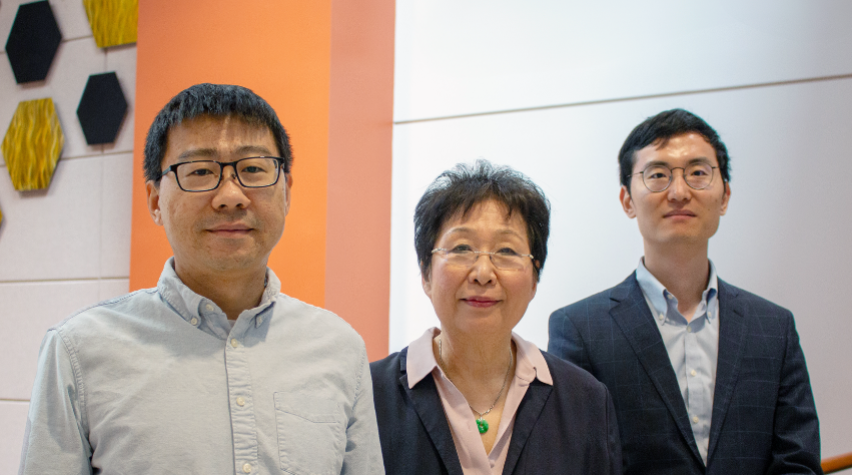
Left to right: Associate Professor Letian Dou, Professor Linda Wang, Assistant Professor Can Li
Purdue’s Davidson School of Chemical Engineering is launching Research Area Endowments to support innovative research in the disciplines that advance chemical engineering. Four of ten initial endowments (Soft Materials: Robert Henson; Separations Research: Norman & Jane Li; Mathematical Modeling: Doraiswami & Geetha Ramkrishna; Process Systems Engineering: anonymous) will be introduced at the school’s reception on Monday at the 2023 AIChE Annual Meeting in Orlando, Florida. Institutional guidelines set these endowments at more than three times that of professorial chairs and enable faculty in those areas to engage in bold and innovative research from the earliest preliminary stages.
Separations research
Dr. Linda Wang’s research in advanced separation methods for producing rare earth and critical elements is helping to meet the world’s need for clean energy solutions. High-purity rare earth and battery elements are essential ingredients for permanent magnets, car motors, batteries for electric vehicles, and many other high-technology products. The demand for critical elements is expected to rise exponentially in the coming decades.
The U.S. relies on imports of most of the critical elements. A key reason is the large environmental footprints of the conventional separation and purification methods for producing the critical elements. Strict environmental regulations in the U.S. make the use of conventional methods too costly to compete with foreign producers. The Wang research group has been developing advanced chromatography purification methods, which can be used to produce pure critical elements with 10 times higher efficiencies and smaller environmental footprints than the conventional methods. Her group is collaborating with industry to scale up the new methods for commercial production of the elements from both mineral ores and waste materials. They aim to help develop a circular economy of the critical materials for our clean energy future.
Mathematical modeling
In the area of mathematical modeling, Drs. David Bernal and Can Li are developing critical algorithms, models, and software to meet everyday challenges faced by chemical engineers and researchers.
The Bernal group works on optimization problems with applications in science and engineering and have experience in the study, design, and implementation of such algorithms using hybrid and novel hardware technologies, including quantum computing, graphical processing units, and classical computing. The research focuses on applications related to challenging problems in chemical, process, and energy systems engineering. The Bernal group has been recognized at national and international level by invitations to seminars and tutorials on quantum computing, and its software tools are used by many researchers and practitioners in chemical engineering and other areas such as computational optimization.
The Li Group is developing theories, algorithms, models, and software tailored to address large-scale optimization and machine learning problems. Their work finds applications in decarbonizing the chemical industry and enhancing supply chain management. A primary challenge lies in managing uncertainties inherent to these applications, including long-term factors like carbon tax and the cost of emerging technologies, as well as short-term uncertainties such as solar and wind output fluctuations. The Li Group is at the forefront of designing algorithms to mitigate these uncertainties. Additionally, they are harnessing the power of large language models like GPT to make mathematical models more user friendly and explainable for non-expert users.
Soft materials research
In the area of soft materials research, Dr. Letian Dou aims to reduce the effects of plastic pollution by developing chemically recyclable polymers with elongated carbon-carbon bonds. Closed-loop circular utilization of plastics is of manifold significance, yet energy-intensive and poorly selective scission of the ubiquitous C-C bonds in contemporary commercial polymers pose tremendous challenges.
Recently, the Dou group developed a ground-breaking approach towards chemically recyclable polymers by creating elongated C-C bonds between the repeating units in a polymer chain. It is hypothesized that the elongated bonds are weakened relative to conventional C-C bonds. This was first verified by first-principle calculations carried out by the Savoie group at Purdue. Then, using this concept, the Dou group developed practically useful hydrocarbon polymers with a desirable depolymerization temperature range, while the Dou group demonstrated scalability of these materials via kilogram scale synthesis in the lab.
The Dou group also evaluates the environmental and human health impacts of these degradable polymers via characterizing the decomposition products under controlled conditions that can be encountered in nature and/or in our daily lives to minimize its environmental footage.
This project presents an unprecedented way of creating fully recyclable polymers that may have profound impacts in polymer, environmental, biological sciences, and industries. The project will also generate a novel conceptual framework for establishing polymeric materials that can be fully converted back to monomeric building blocks for reuse in a concise and economically viable manner. The environmental and human health impacts of these novel polymers will be examined as well, making them one step further toward real applications. This conceptual framework may eventually lead to the development of commercially useful polymer materials and significantly reduce plastics pollution in the future.
Disclosure: This post is sponsored by Purdue’s Davidson School of Chemical Engineering and reflects their views, opinions, and insights.


